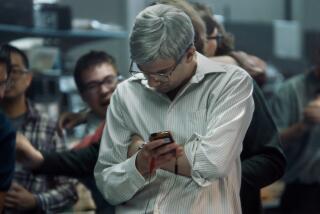BlackBerry losing its cool even among owners
- Share via
Not so long ago, consumers couldn’t get enough of their CrackBerrys. Now it appears many are sobering up.
In a tech landscape crowded with new gadgets and features, the BlackBerry, once the undisputed leader of the smartphone industry, is rapidly losing ground to Apple Inc.’s iPhone and devices that run Google Inc.’s Android software.
Just two years ago, BlackBerry accounted for 43% of the U.S. smartphone market. These days, that figure has dropped to about 19%, according to market research firm ComScore Inc.
Even longtime users acknowledge there’s something decidedly uncool about owning a BlackBerry.
“I’m like that old lady driving an Oldsmobile in a parking lot when everyone else is driving BMWs,” said Jesica Ryzenberg, 32, a BlackBerry owner in San Francisco.
Recent turmoil hasn’t helped matters, including numerous product and software delays. Several top executives at BlackBerry maker Research in Motion Ltd. have departed. More recently, the phone that built its reputation on security and reliability was struck by a three-day service outage that affected users on five continents.
And now in the ultimate sign of its troubles, the company has been pegged as a takeover candidate.
Last week RIM’s stock, down 70% from the beginning of the year, fell below its book value for the first time in nine years, a sign investors consider the Canadian smartphone maker to be worth less than the net value of its property, patents and other assets, according to Bloomberg News data.
“Clearly the market has moved on,” said Chris Jones, principal analyst at research firm Canalys. “From applications to multimedia to the quality of the cameras to the quality of the browsing experience, it’s lacking in all of those areas, plus more.”
But even as BlackBerry’s share of the cellphone market continues to shrink, analysts say, the brand is not quite this generation’s PalmPilot — yet.
In the mid-1990s, the hand-held PalmPilot personal digital assistant helped spark the mobile digital revolution but rapidly became outdated as more smartphones entered the market. Last year Hewlett-Packard Co. announced it was buying Palm Inc. for $1.2 billion.
With BlackBerry, “I wouldn’t count them out entirely, but it’s definitely going to be an uphill battle,” said Shaw Wu, an analyst at Sterne Agee.
RIM executives are brushing off signs of trouble. They say BlackBerry continues to have a loyal customer base of 70 million subscribers, many of them professionals and young tech users, and point to a marketplace that has yet to be fully tapped: In the U.S., only 37% of cellphone users have a smartphone, said Rick Costanzo, regional managing director of RIM’s Americas division.
“We are in the very early, early stages of a huge global transition, and we have everything to play for. This game is far from over,” he said. “Our challenge is to educate the marketplace.”
Sales and reviews for BlackBerry devices running the company’s new OS 7 operating system, with browser speeds that are outperforming rivals, have been strong, executives say. Co-Chief Executive Jim Balsillie said in a September conference call with analysts that the BlackBerry 7 launches were going “extremely well” and that the company felt well-positioned for the holiday season.
RIM is rolling out several new features and devices in the coming months, including a software upgrade to its PlayBook tablet in February that will enable the device to run Android apps. Next year, the company is planning to release its BBX operating system, which will also be compatible with Android apps, to phones and tablets.
Analysts say that although BlackBerry’s image has slipped in the U.S., the brand still has a strong foothold in regions including Southeast Asia, Latin America, Britain and India, where growth has been robust and BlackBerrys are seen as a status symbol.
Loyal BlackBerry users such as Tyson Lee, 34, say that although the phones aren’t trendy anymore, they still get the job done. Lee prefers the BlackBerry’s physical push keyboard over the iPhone’s touch screen. “I can see past the hype,” he said.
“I’m not the usual BlackBerry user where it was thrust on me by work; I actually sought it out,” said Lee, a mechanical engineer from Downey. “I’m comfortable with it. Yeah, it’s slow. I’ve seen faster browsers on the iPhone and Android, but I really can pop out an email faster than any of my friends.”
But the smartphone market is about much more than wireless email these days, and BlackBerry has lagged when it comes to innovation, said Wu, the Sterne Agee analyst. Even one of BlackBerry’s strongest customer bases — corporations hooked by the device’s solid security capabilities — has been weakened by the so-called consumerization of IT that developed during the economic downturn.
To cut back on costs, many businesses stopped providing employees with BlackBerrys but allowed them to bring in their own smartphones, which were then configured for work use. With so much buzz surrounding newer brands, many workers opted to buy iPhones and other devices.
As RIM tries to win back or draw new customers in the U.S., many former BlackBerry aficionados say it may be too late.
After eight years and six BlackBerry models, Ourfa Coco Zinali, 23, said she’d had enough of her phone’s frequent shutdowns and frozen screen, poor battery life, lack of apps and slow browser speed. After nearly all of her friends ditched their BlackBerrys for other devices, there were fewer people to connect with through the BlackBerry Messenger instant messaging application, rendering one of the phone’s most popular features useless.
Her latest BlackBerry, a Bold 9700, broke down so often that Zinali said she replaced it nine times before giving up. Last week the Van Nuys resident went to the Apple store at Northridge Fashion Center, where she bought a white iPhone 4S.
“I took it home and I couldn’t take my hands off of it. There’s so much to do on there, and it’s so fast. Already, I would never, ever go back to BlackBerry,” she said.
“It was like a relationship: Yeah, I loved you and we had a good time, but I’ve moved on.”
Times staff writer Nathan Olivarez-Giles contributed to this report.
More to Read
Inside the business of entertainment
The Wide Shot brings you news, analysis and insights on everything from streaming wars to production — and what it all means for the future.
You may occasionally receive promotional content from the Los Angeles Times.









